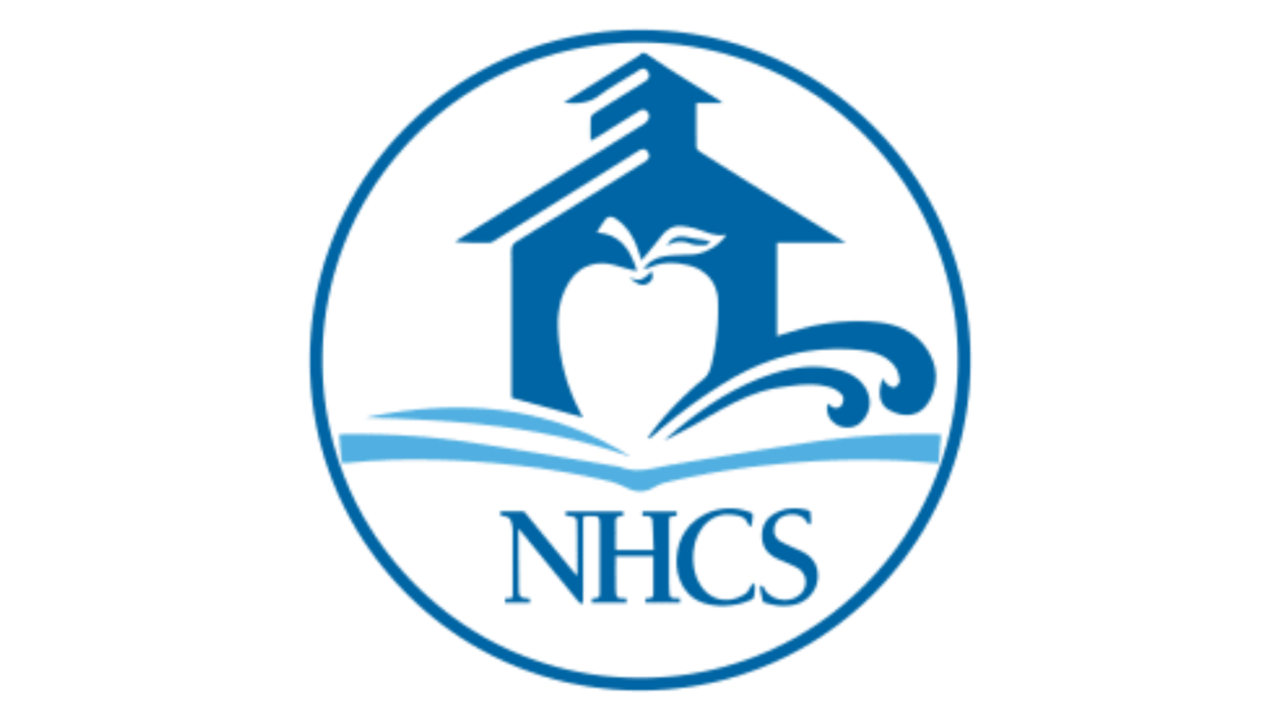
New Hanover County Schools supports the Black Lives Matter movement; trains staff and educators on implementing racial equity into classrooms
Incidents
New Hanover County Schools promotes the “2nd Annual Virtual Race and Social Justice Institute” on the homepage of the district’s website as a “4 night event in February.” The school district’s website links to a page on the website of New Hanover County explaining the event will be discussing “social justice” and “race” in education. The event page states that “sessions will engage the audience in an examination of different historical and socio-political contexts of education, local and national advocacy efforts with communities of color and education, policies that affect educational practice, and ways to move toward hope and healing.” The four sessions will take place throughout the month of February.

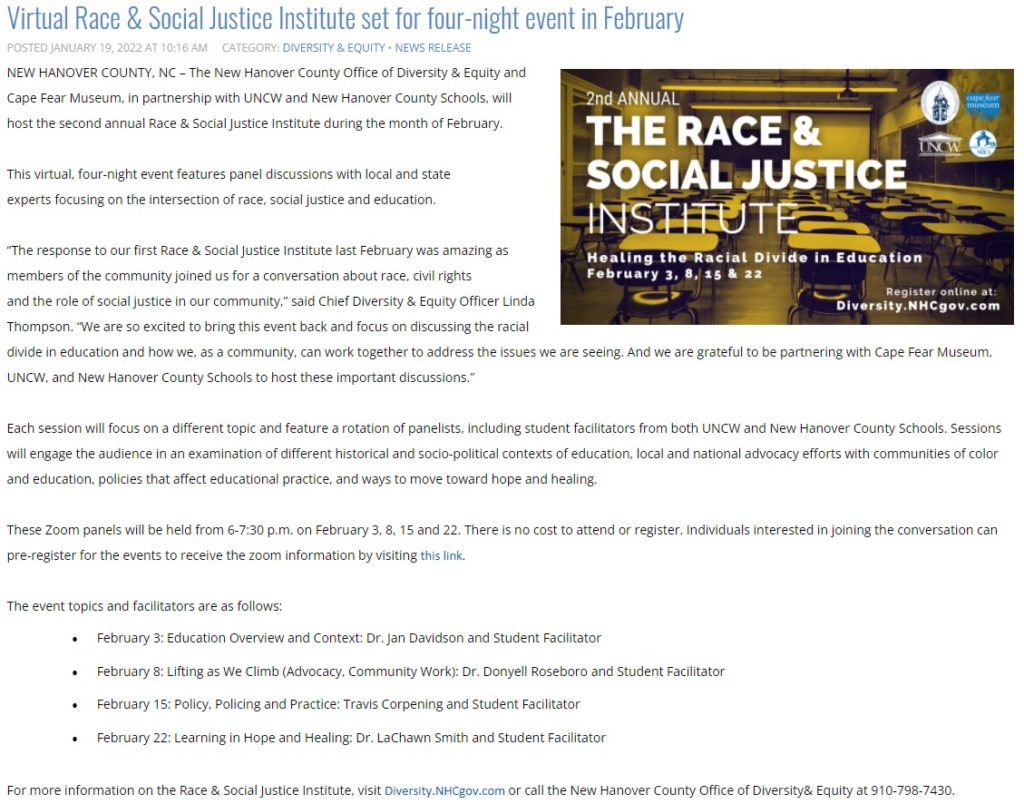
The school district’s homepage also links to another page on the website called “NHCS Equity Overview.” This page explains that “district-wide work is underway to help staff members through professional development consider the role that implicit bias plays in impacting learning.” The page features a video titled “NHCS Stands for Equity” that affirms the school district’s support for “Black Lives Matter.”
One person in the school district’s video explains, “We understand that as an educational system we have a unique responsibility in fostering acceptance, understanding, and love in our community and its members.” (Time Stamp: 0:52) Another person in the video says that staff in the school district had training in racial issues: “Educators, administrative staff, bus drivers, and child nutrition staff have undergone implicit bias professional development and groundwater training.” (Time Stamp: 2:48) “Groundwater” has been described as helping “practitioners at all levels internalize the reality that we live in a racially structured society, and that is what causes racial inequity.”
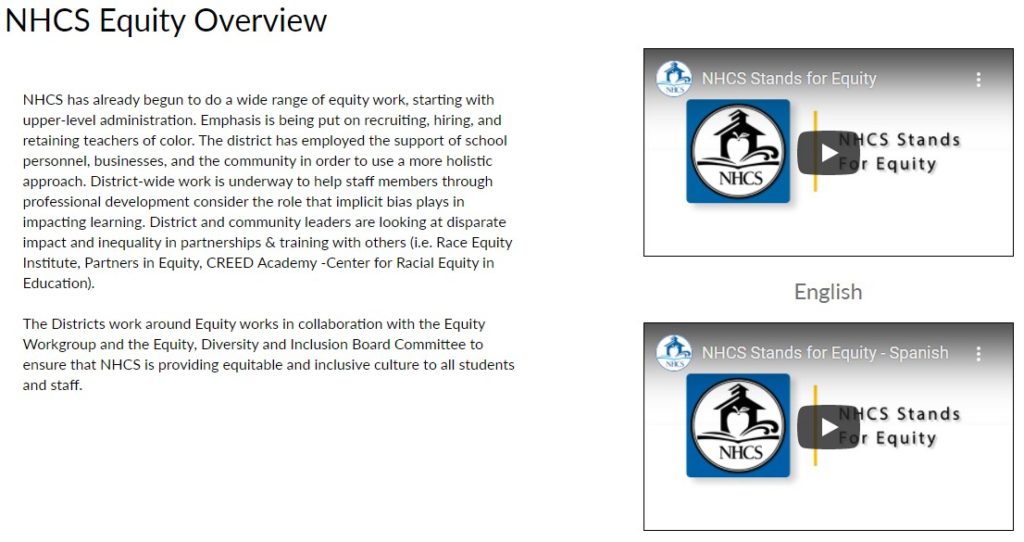
The school district also brags that its staff and educators have been trained in recent years in topics like “racial equity,” “implicit bias,” and “social issues.” Staff and educators have also participated in “book studies” to read social justice books, including How to Be an Anti-Racist and White Fragility.

The school district promotes an “Equity Workgroup” and an “Equity Board Committee.” The Equity Workgroup is described as a group of district staff “who meet once a month and are dedicated and committed to improving equity within the district.” The mission statement for the Equity Board Committee explains that the committee “will ensure New Hanover County Schools celebrates our diverse community through growing a sustainable environment that embraces inclusion, provides equitable opportunities and affirms our humanity.”
The page for the Equity Board Committee links to another page called the “Equity, Diversity and Inclusion Committee.” This committee has “SMART Goals” to achieve for the district. These goals include to “train all NHCS employees to understand and respond to implicit bias” and to “ensure equitable discipline practices for students.”



The school district also promotes a podcast from the Equity, Diversity and Inclusion Committee. The most recent episode of this podcast appears to be from April 20, 2020. This committee also held meetings with the latest appearing to be June 15, 2020. The school district’s website contains records of what was discussed at these meetings.
The document for the June 15, 2020, meeting mentions using the books How to be Anti-Racist and White Fragility: Why It’s So Hard for White People to Talk About Racism for book studies. The document also contains notes of the committee discussing how it can bring student equity teams together and train them.

The document for the November 18, 2019, meeting provides resources labeled “Anti-racism and Gifted education” and “Summary and resources from the 5th annual Safe Schools NC conference.” The “Safe Schools” resource links to a conference program titled “Embracing Inclusive Advocacy: Classrooms. Communities. Coalitions.” The conference is labeled as a “LGBTQ+ Conference for Educators and School Communities.” The program promotes breakout sessions titled “Transgender Students: The Do’s and Dont’s of Classroom Acclimation,” “Everyday Resistance in the Classroom,” “Using Picture Books to Build an Inclusive Community in Any Classroom,” and “Disrupting Heteronormative School Cultures.”
The school district has a page called “Equity FAQ’s” that appears to state all of the school district’s staff are participating in racial equity training, specifically using the “Groundwater approach”:
Principals, assistant principals, teachers and school level staff are participating in training on implicit bias. The district is using the Groundwater approach, which is designed to help to see reality of living in a racially structured society, and the causation of racial inequity. School staff has had the opportunity to participate in Race Equity Training in phases. They have been made aware of the concern regarding equity, and the need to address it. The work is ongoing.

The school district also has an “Equity Resources” page that features what appears to be an equity wheel. Categories in this wheel include “ethnicity,” “gender,” “race,” and “sexual orientation.” The school district states on the page that the process to become a “more equity literate educator” is “crucial to being able to explore issues of power, privilege, and oppression in order to recognize how these impact institutions and spaces where teaching and learning occur.” The page then links to an “Equity Literacy” document with additional resources for educators on how to be an “equity literate educator.”
The document discusses educators developing “lenses for equity”:
Developing lenses to analyze how power, privilege, and oppression function in your life, the world, the curriculum, and institutions/systems means you will never be able to see any of them the same way again.
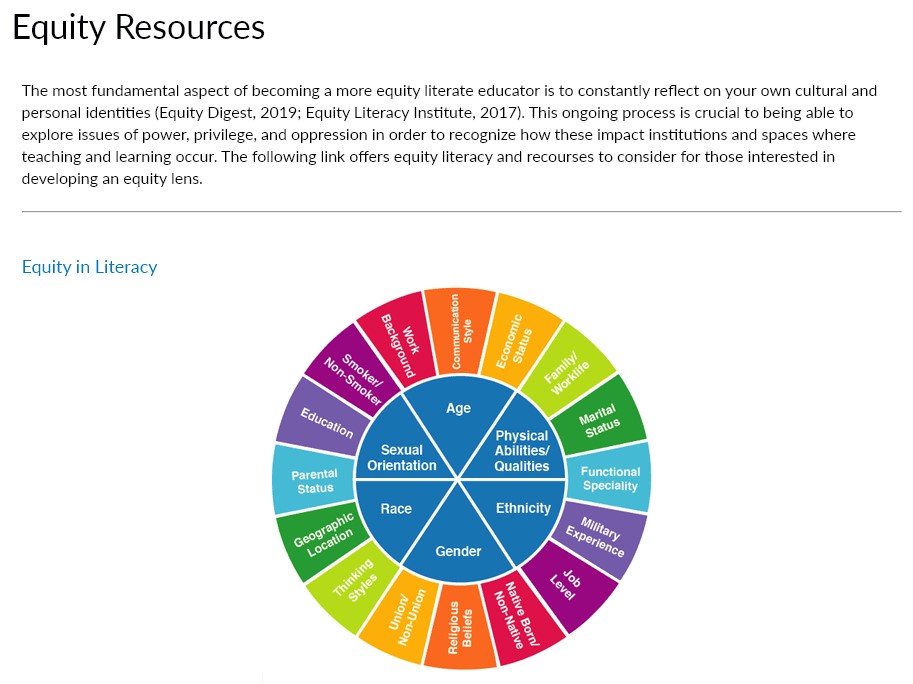
The document has numerous resources for educators, including resources titled “Basic Principles for Equity Literacy,” “It’s Time to Move Beyond Buzzwords and Radically Re-imagine Schools,” “Social Justice Books,” “Teaching 6-Year-Olds About Privilege and Power,” “Building Equity in Your Teaching Practice,” and “40+ Books for Anti-Racist Teachers.”
The author of the article “It’s Time to Move Beyond Buzzwords and Radically Re-imagine Schools” appears to make a racist comment by stating that “it is not possible for educators today, particularly educators of Black and Brown children to naively believe that White, patriarchal, and classist approaches to educating our children will yield anything different, or any good thing for that matter.” The author of the article “Teaching 6-Year-Olds About Privilege and Power” appears to advocate for teaching children in first grade about “microaggressions, gender inequality, gender identity and structural racism.”
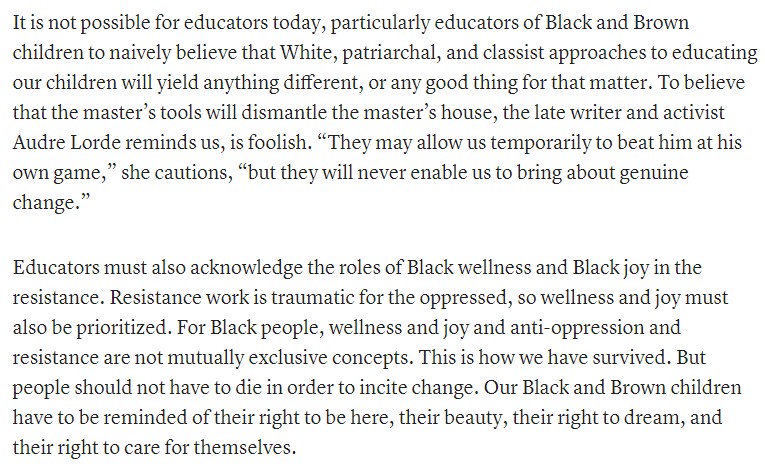
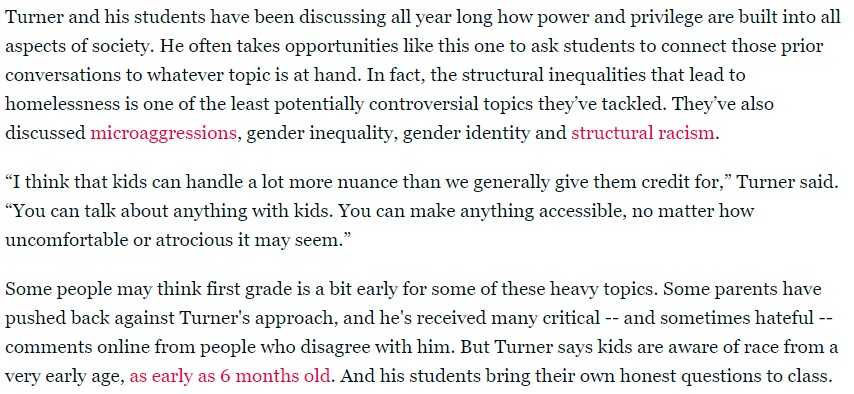
The “Social Justice Books” resource links to a website that promotes several lists of books with categories such as “Gender Identity,” “LGBTQ+,” and “Racial Identity.” The “Gender Identity” category includes books titled I Am Jazz and Jack (Not Jackie) that appear to support young children transitioning to another gender. I Am Jazz describes the story of a young boy who transitions to being a girl. Jack (Not Jackie) describes the story of a young girl who transitions to being a boy.
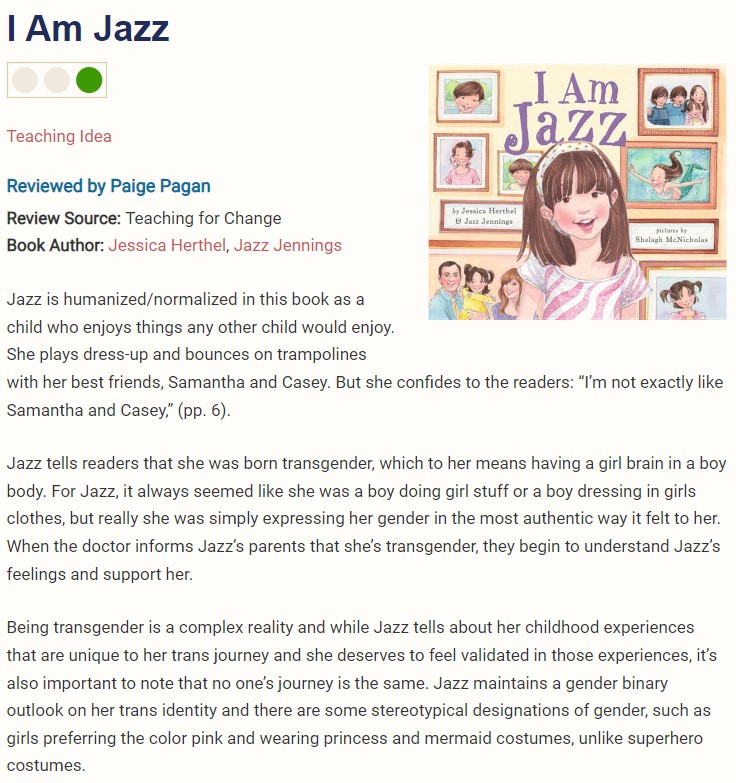
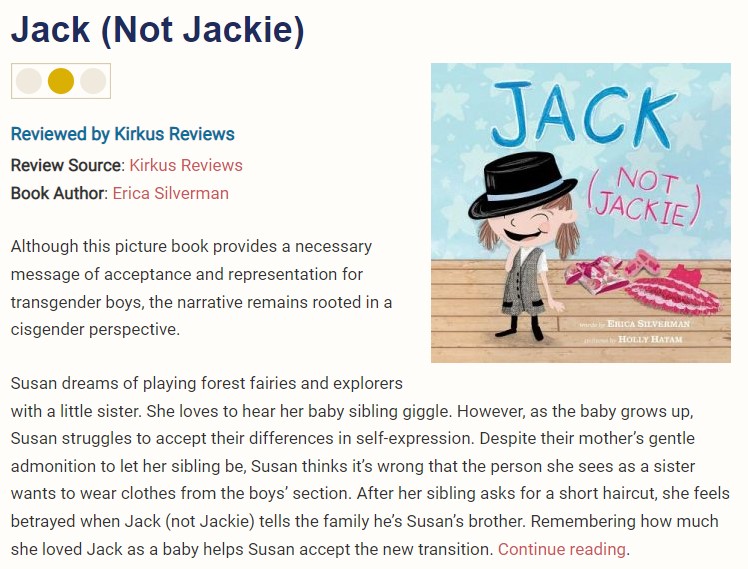
The “40+ Books for Anti-Racist Teachers” resource promotes books titled Culturally Responsive Teaching and the Brain, Promoting Racial Literacy in Schools, Courageous Conversations about Race, For White Folks Who Teach in the Hood, Transformative Ethnic Studies in Schools, and The Guide for White Women Who Teach Black Boys. Most of the books appear to support implementing racial equity and similar issues into the curriculum for schools moving forward.

The school district’s “Equity Literacy” document also promotes LGBTQ resources for educators and GLSEN resources for students. The organization GLSEN is known for promoting LGBTQ issues to young children. GLSEN states that “while many LGBTQ+-inclusive school supports begin in middle or high school, it is critical for elementary schools to establish a foundation of respect and understanding for all people.” The organization has also appeared to show support for children taking “hormone replacement therapy” to transition to another gender:
Upon birth, we are typically categorized into one of two genders (boy or girl) depending on how our genitals are read. Throughout our lives, however, our many bodily characteristics work together to create a unique path of development, causing some of us to grow really tall, and others to remain short, or some of us to grow hair under our armpits and legs, while others remain bare. While this development often happens on its own during puberty, this change can also be administered through medicine, such as hormone replacement therapy. Since our society often conflates our bodies (or genitalia) with our gender identity, it is critical that we allow space for people to self-identify.
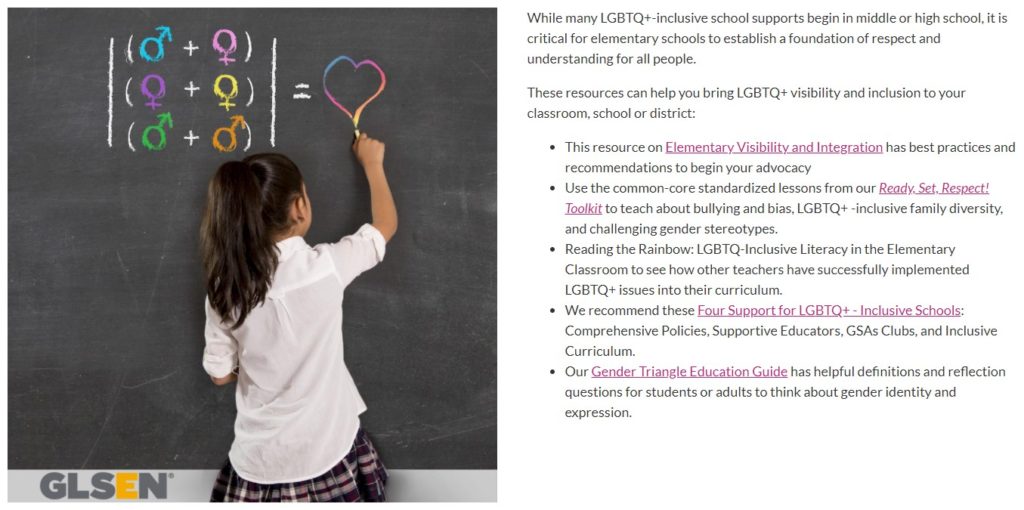

Stay Informed
